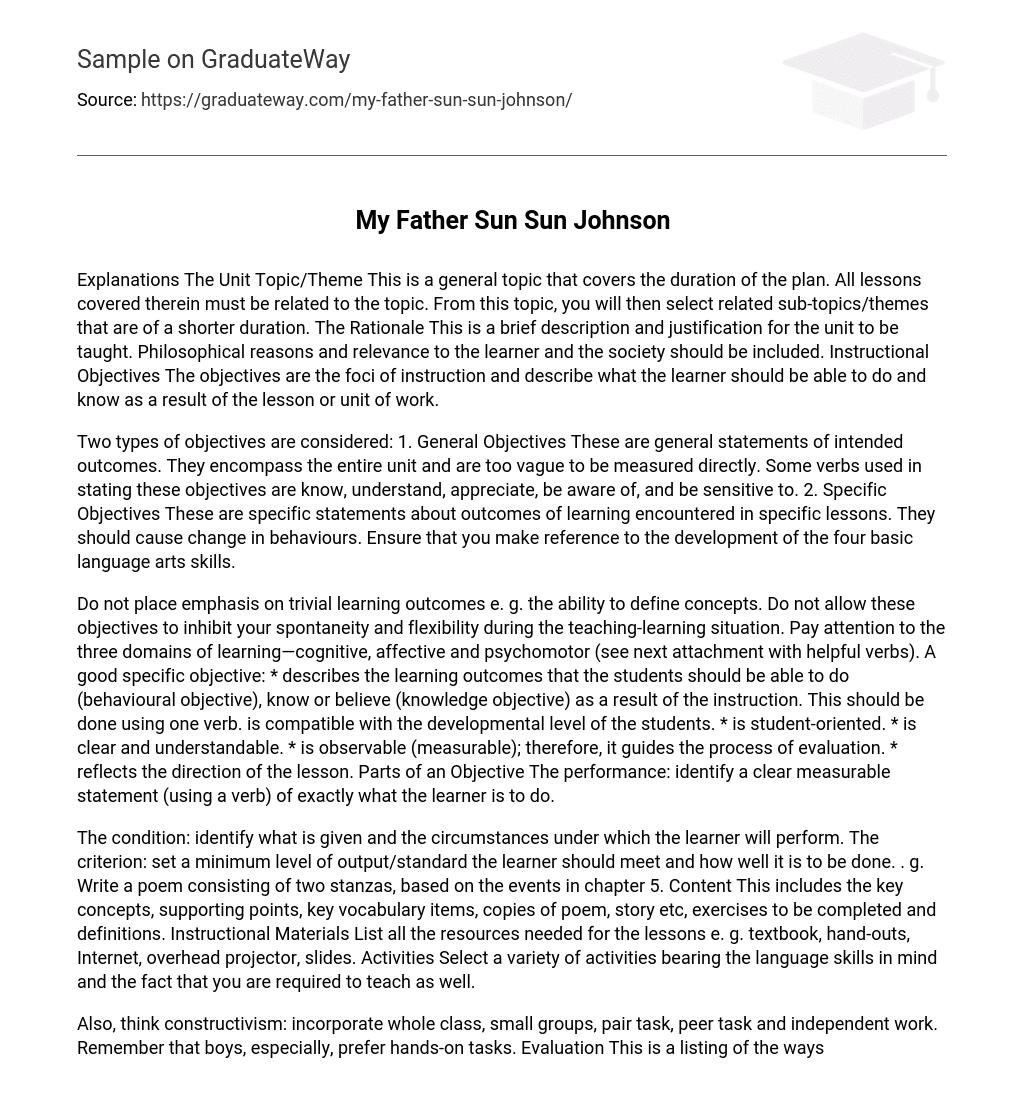Explanations The Unit Topic/Theme This is a general topic that covers the duration of the plan. All lessons covered therein must be related to the topic. From this topic, you will then select related sub-topics/themes that are of a shorter duration. The Rationale This is a brief description and justification for the unit to be taught. Philosophical reasons and relevance to the learner and the society should be included. Instructional Objectives The objectives are the foci of instruction and describe what the learner should be able to do and know as a result of the lesson or unit of work.
Two types of objectives are considered: 1. General Objectives These are general statements of intended outcomes. They encompass the entire unit and are too vague to be measured directly. Some verbs used in stating these objectives are know, understand, appreciate, be aware of, and be sensitive to. 2. Specific Objectives These are specific statements about outcomes of learning encountered in specific lessons. They should cause change in behaviours. Ensure that you make reference to the development of the four basic language arts skills.
Do not place emphasis on trivial learning outcomes e. g. the ability to define concepts. Do not allow these objectives to inhibit your spontaneity and flexibility during the teaching-learning situation. Pay attention to the three domains of learning—cognitive, affective and psychomotor (see next attachment with helpful verbs). A good specific objective: * describes the learning outcomes that the students should be able to do (behavioural objective), know or believe (knowledge objective) as a result of the instruction. This should be done using one verb. is compatible with the developmental level of the students. * is student-oriented. * is clear and understandable. * is observable (measurable); therefore, it guides the process of evaluation. * reflects the direction of the lesson. Parts of an Objective The performance: identify a clear measurable statement (using a verb) of exactly what the learner is to do.
The condition: identify what is given and the circumstances under which the learner will perform. The criterion: set a minimum level of output/standard the learner should meet and how well it is to be done. . g. Write a poem consisting of two stanzas, based on the events in chapter 5. Content This includes the key concepts, supporting points, key vocabulary items, copies of poem, story etc, exercises to be completed and definitions. Instructional Materials List all the resources needed for the lessons e. g. textbook, hand-outs, Internet, overhead projector, slides. Activities Select a variety of activities bearing the language skills in mind and the fact that you are required to teach as well.
Also, think constructivism: incorporate whole class, small groups, pair task, peer task and independent work. Remember that boys, especially, prefer hands-on tasks. Evaluation This is a listing of the ways in which you will measure the extent to which your main objective(s) have been met. CONSTRUCTING DAILY LESSON PLANS Possible Format Subject: Unit Topic: Lesson Topic: Grade: Date: Duration of Lesson: General Objectives: Specific Objectives: Previous Knowledge: Methodology: Instructional Materials: Content: Developing the Lesson
Introduction: relate to the students’ experiences, activate schemata, develop students’ interest, set the tone for and purpose of the lesson. The introduction lasts about 5-10 minutes, depending on length of contact period. The last section of the introduction should blend into the lesson to be taught. NB. The teacher should explicitly advise the students of the connection between the introduction and the lesson to be taught. Development: A step-by-step documentation of how the specific objectives are to be developed.
The last step (referred to as the ‘culminating activity’) should constitute a summary of the lesson. NB. A step consists of the: * concept * teacher activity * student activity * instructional materials * evaluation e. g. Students will listen to a dub poem done by the teacher and identify the pairs of words that are opposite in meaning. Students will use these words in sentences. NB. 1. If you plan to brainstorm ideas, include some examples of the questions to be asked of your students. 2. Time each activity at the planning stage.
Evaluation 1/Assessment: At this stage, the extent to which the specific objectives are achieved is being assessed. Ensure that this task extends students’ learning and is not constructed simpler than the previous tasks. Evaluation 2: a brief critical analysis of the lesson taking into consideration: * whether the objectives were achieved, citing reasons; * the circumstances that affected the lesson, whether negatively or positively; * a plan of action for further remediation exercise, where applicable; * what should be taught in the next lesson.





